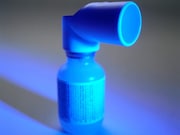Findings seen in two large international clinical trials comparing three-drug inhaler to two-drug inhaler
THURSDAY, Oct. 3, 2019 (HealthDay News) — A three-in-one inhaler therapy can improve lung function and reduce asthma attacks in adults with uncontrolled disease, according to a study published online Sept. 30 in The Lancet.
Johann Christian Virchow, M.D., from Universitätsmedizin Rostock in Germany, and colleagues compared the single-inhaler extra-fine combination of beclometasone dipropionate (BDP; inhaled corticosteroid), formoterol fumarate (FF; long-acting β2 agonist), and glycopyrronium (G; long-acting muscarinic antagonist) to the combination of BDP and FF. They used data from two international parallel-group, double-blind, randomized, active-controlled, phase 3 clinical trials (Triple in Asthma With Uncontrolled Patients on Medium Strength of ICS + LABA [TRIMARAN; 1,155 patients] and Triple in Asthma High Strength Versus ICS/LABA HS and Tiotropium [TRIGGER; 1,437 patients]).
The researchers found that in TRIMARAN, week 26 predose forced expiratory volume in 1 second improved in the BDP/FF/G group by 57 mL (95 percent confidence interval [CI], 15 to 99; P = 0.0080) versus the BDP/FF group and by 73 mL (95 percent CI, 26 to 120; P = 0.0025) in TRIGGER. Reductions in the rate of moderate and severe exacerbations reached 15 percent in TRIMARAN (rate ratio, 0.85; 95 percent CI, 0.73 to 0.99; P = 0.033) and 12 percent in TRIGGER (rate ratio, 0.88; 95 percent CI, 0.75 to 1.03; P = 0.11). Treatment-related serious adverse events occurred in four patients: one in TRIMARAN (in the BDP/FF/G group) and three in TRIGGER (one in the BDP/FF/G and two in the BDP/FF group). Adverse events led to death in three patients in the BDP/FF/G group in TRIMARAN and two patients in TRIGGER (one in each group). No deaths were thought to be related to treatment.
“In uncontrolled asthma, addition of a long-acting muscarinic antagonist to inhaled corticosteroid plus long-acting β2-agonist therapy improves lung function and reduces exacerbations,” the authors write.
The study was funded by Chiesi Farmaceutici.
Copyright © 2019 HealthDay. All rights reserved.








